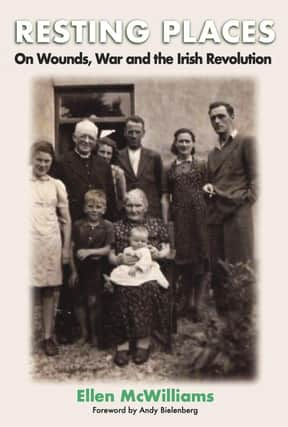Ken Funston: Book serves as a reminder of the necessity of properly dealing with a violent past


The book Resting Places: On Wounds, War and the Irish Revolution by Ellen McWilliams explores how unresolved suffering ‘haunts’ the present, with those scars living on in their descendants today. It doubly demonstrates the necessity of properly dealing with a violent past, our recent history aptly displays that.
This is not simply an historical narrative. It is deeply personal in places, outlining the author’s early life, her formative years and her family background. It deals with national identity, her maternal instincts and all that these entail. It also displays her intense knowledge and affection for her home area in Cork county. This fittingly leads us into her passionate connection to, and understanding of the Dunmanway Massacre, a spate of killings that took place near Dunmanway and the Bandon Valley in west Cork in April 1922.
Advertisement
Hide AdAdvertisement
Hide AdEllen McWilliams (née McCarthy) was, in her early years, unaware of what had taken place in her locality some two generations previous. Thirteen Protestant men were murdered, and disappeared, in the townlands around Bandon, Ballineen and Enniskeane, Dunmanway and Clonakilty. ‘The eldest of the men was in his 80s and the youngest was a boy of 16.’ The murders were to have a profound effect on the minority Protestant community, with many leaving Ireland, although there were some who did stay.
In modern parlance, these murders by the IRA would be termed as ‘signal crimes’ that would have a disproportionate impact on the Protestant community to either leave or maintain a low profile. West Cork was to be replicated in Galway, South Armagh and North Fermanagh, and other areas in 1922. The incidents were to create a profound hostility and suspicion towards the Irish republic within the Protestant Unionist population. That was to be further characterised in the perceived lack of action by the Irish government during the recent Troubles.
The author relates to the 1921 murder of a Protestant farmer, Thomas Bradfield, by the IRA. Bradfield’s house was later purchased by her grandfather and was to become the house she grew up in. She describes her familiarity and intimacy with the house, including the sitting room Bradfield was taken from immediately prior to his murder nearby. The foreword to the book states that the ‘selection of targets was certainly characteristic of a sectarian reprisal’ by the IRA. It continues by highlighting that ‘these killings were the exception to the rule, in terms of scale, ferocity, and sectarian targeting.’
Ellen does not attempt to disavow her family’s republican past, highlighting her great grandmother’s involvement in Cumann na mBan, whilst her great uncle, Gerry Foley, was a member of the Cork IRA, and her grandfather Francie who was a ‘runner’ for the IRA in his youth. She also speaks lovingly of her husband’s fascination with Oliver Cromwell, and his great uncle, Harry McWilliams, who was killed at Ypres in 1915.
Advertisement
Hide AdAdvertisement
Hide AdPrelude reflections are written by Charles Duff, whose grandfather was one of the Protestants murdered in 1922, and Neale Jagoe whose grandfather fled west Cork at that time in fear of his life. Ellen reveals that the Jagoes had supported her grandfather when he was struggling against republican opposition to him taking over the Bradfield farm.
There are still three unrecovered bodies of the victims hidden in the killing fields of West Cork, with the families, ‘still waiting as they are a hundred years later for a resting place to visit.’ It is as Ellen states, ‘History cannot be undone, and we are left, if we are lucky with some broken prayer that puts ointment on the wound in hope of healing.’ There are a lot of us hoping that those wounds could be healed, whilst the perpetrators remain silent on their evil deeds of the past.
Ken Funston is a former Advocacy Manager with the South East Fermanagh Foundation (SEFF)